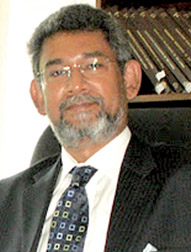Call for a new global socio-economic system
|

Dayan Jayatilleka
|
”We have on one hand, humanism and post-humanism, human science and
ethics and these are bracketed. And we have got humanism and
post-humanism, science and ethics; all related to the overall rubrics of
the discussion on the new humanism. said Ambassador Dayan Jayatilleka,
at the New Humanism Initiative, UNESCO, Paris on Tuesday.
He said; Let me shift to post-humanism which is not the same as new
humanism. We may understand humanism in one of three senses. One sense
that David Gimbel intended it yesterday that’s that man’s presence in
the cosmos has in fact been of relatively short duration and may in fact
end. So in that sense we are talking about post-humanism.
But it all depends on the stress one places, if it is human
post-HUMANism, are we talking about post-man or are we talking about
post-humanISM in terms of transcendence of an idea and a school of
thought.
So post-humanism in the sense of “the end of man”, this is one.
Post-humanism also in the terms of the transcendence of a philosophy.
But there is a third sense which I would wish to draw your attention
because humanism, be it the humanism of the earlier centuries or one
which hopefully remains a project on “new humanism”, has to face the
challenge that was posed by Nietzsche when he said “Man is something
that has to be overcome”.
Now what did he mean by this? He did not mean some sort of genetic
experiment. What Nietzsche meant was that the values by which man lived
in the Homeric heroic age. Nietzsche has, you know, been ambivalent on
the Socratic moment. And he sought what he calls the transmission of
values to perhaps restore that to a certain heroic grandeur. So when we
discuss post-humanism we must transcend and go beyond the smugness in
which we place man as he or she exists, at the centre of philosophy. We
must also think of the limits of men, his existential limits, the limits
in terms of values, the limits in terms of consciousness that Nietzsche
was addressing. Since we are here in Paris, it is important to remember
that Jean Paul Sartre and Simone de Beauvoir chose to call Ernesto Che
Guevara “the most complete man of our age”, the age of the 20th century.
In that sense, it was an echo, an answer to Nietzsche’s problems of
the fall or decline of man and the need or the evolution of a new or
restored type of man who combines certain qualities. If we move to
science and ethics, I would like to shift the emphasis from the ethical
limits on norms on scientific experimentations to the social. Science is
a double edged sword.
On one hand, it has exponentially expanded the possibilities. On the
other, it has also exponentially increased the hazards, the dangers.
This is where ethics come in, because the point I think is not to place
a cap of ethics on development of science.
This is not only wrong, it is historically wrong in terms of the
evolution of ethics, mathematics, politics; philosophy and ethics
existed together, if we go back to the Greeks.
I think ethics comes in, in a different sense. Is it possible for us
to permit, encourage, enhance the possibilities that science open up
while minimizing, determining, protecting ourselves, our species against
the catastrophies that looms with the unfettered development of science.
The point therefore is to have an economic and a social experiment
that would permit the development of science to benefit humanity, for
instance in the realm of medical research as the fight against cancer,
but on the other hand combating the effects of climate change. And there
we are talking not only about political will but of an economic system
and a political system because what we have today and what we have
experienced are anti-humanistic systems which I refer to as predatory,
namely neo-liberal capitalism and statist-socialism.
We have had climate change and natural disasters and man-made
disasters that both systems have caused.
Ethics and science come in in the sense that the challenge is to
imagine an order, a social structure, a social system, social
arrangements and economic arrangements which are in fact humanistic,
which place man and everything that he and she needs to sustain
themselves in this ecosystem.
There is where we must address our efforts when we think about
science and ethics. If I may bring it back to the new humanism; in what
sense must a new humanism be new? I would say that humanism has to be
globalised. This is not to deprive or deride the breakthroughs made in
the West and in the North in the history of the human thinking. But we
must seek out the Southern and Eastern contributions to human-centric
world outlook.
The globalization of humanism which could be new may also take us to
older routes of humanism. So there will be continuity and change.
The saying attributed to the Buddha 2500 years ago, which may or may
not derive inspiration from the earlier tradition of the Vedas, where he
said: “May all living beings be happy”. That is the challenge.
Is it possible or not to imagine a social and economic system which
will permit all living beings to be happy?”
|

